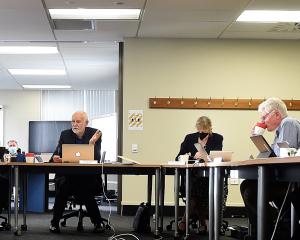Carole Heatly admits she did not realise what she had let herself in for when she moved to Dunedin from England to run the Southern District Health Board.
The former National Health Service boss found ''two distinct cultures'' at the health authority. Ms Heatly, a Scottish woman who trained as a nurse before entering management, has been chief executive for about 15 months. Retaining the best of what existed in Dunedin and Invercargill while merging their systems was her biggest challenge.
''[The job] had more challenges than I at first thought it might have, and that was because I thought the merger of the two organisations was further down the road than it actually was.''
Officially the Otago and Southland health boards merged in 2010, but it was largely in name only.
While the dynamics of the Invercargill-Dunedin relationship create internal tensions, it is of little interest to the public. In contrast, ditching respected local provider Presbyterian Support Otago from its home-based help service sparked a public backlash for which the board appeared unprepared.
''I think with hindsight on the home-based care, we could have prepared more for a big provider being unsuccessful in the process.
''The process itself was very clear and straightforward and [the new service] has been really successful in implementing, but I don't think Presbyterian Support Otago thought they wouldn't come in the top three, so maybe we should have done more of the `what if' scenarios.''
The admissions are rare from the 54-year-old, an affable and upbeat person who talks up the board, never criticises the Government, and is known for her warm good humour. She has been publicly criticised by the head of the senior doctors' union, Ian Powell, for not engaging enough in operational matters, an assertion she dismisses.
She acknowledges she has been focused on the board at a ''strategic'' level, allowing clinical departments to be more autonomous than previously. Ms Heatly has tended to avoid media contact, and was accompanied at her interview this week by communications director Steve Addison. Mr Addison sometimes steps in to elaborate on her answers in the interview.
Asked about her reluctance to speak to media, she said people preferred hearing from clinicians rather than managers.
She said she engaged with staff frequently, citing numerous groups she had met recently, including a frank-sounding meeting with general surgeons last week. Their concerns included gaining quicker access to operating theatres for their patients, she said.
''The care and compassion that's demonstrated through our services every day is outstanding,'' she said.
She will also lead a series of ''workshops'' this month with middle management staff whose roles the board is changing to focus less on hospitals and more on the community. She dropped plans for a formal restructuring to avoid the disruption.
Asked if the deficit-ridden board was making ''concrete changes'' called for by Health Minister Tony Ryall in his last yearly approval letter, Ms Heatly indicated she was doing what was required while balancing cost reduction with maintaining services.
''We need to make change at a pace that the staff can work with, and that doesn't disrupt services so much.''
A projected $12.5 million deficit for this year would be bigger without the determination and hard work of staff, she said, which was greatly appreciated.
Ms Heatly was seen as bringing a fresh approach to sort out a dysfunctional culture, particularly at Dunedin Hospital, identified by a stinging National Health Board report nearly two years ago, parts of which were rejected by her predecessor, Brian Rousseau.
Asked about relationships with Wellington officials, which the 2011 report had further strained, she said they were in good health.
''Seriously, I find it really straightforward. I think that's one of the real things that I admire about the Kiwis is that there is just straight-talking, honest, reliable people, and that's been my experiences of Wellington.''
At a personal level, she was enthusiastic about her new home.
''I have loved the move to the south of the South Island. I feel I've swapped one Scotland for another in terms of scenery and weather but with the added benefit of the Kiwi way of life, more laid-back, outdoors and less people, traffic, pollution and litter, and the wine is better,'' she said.











